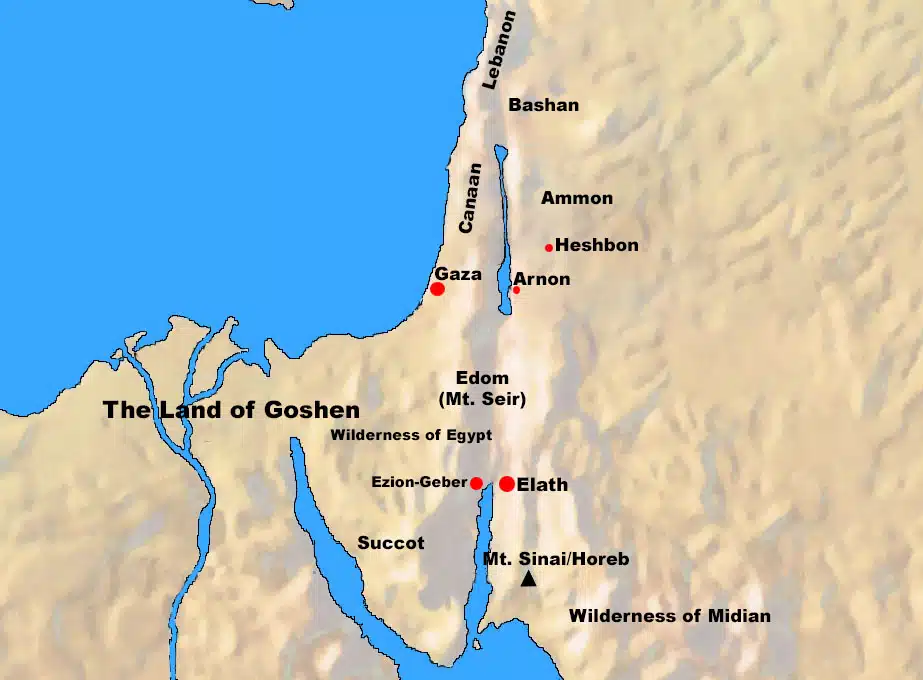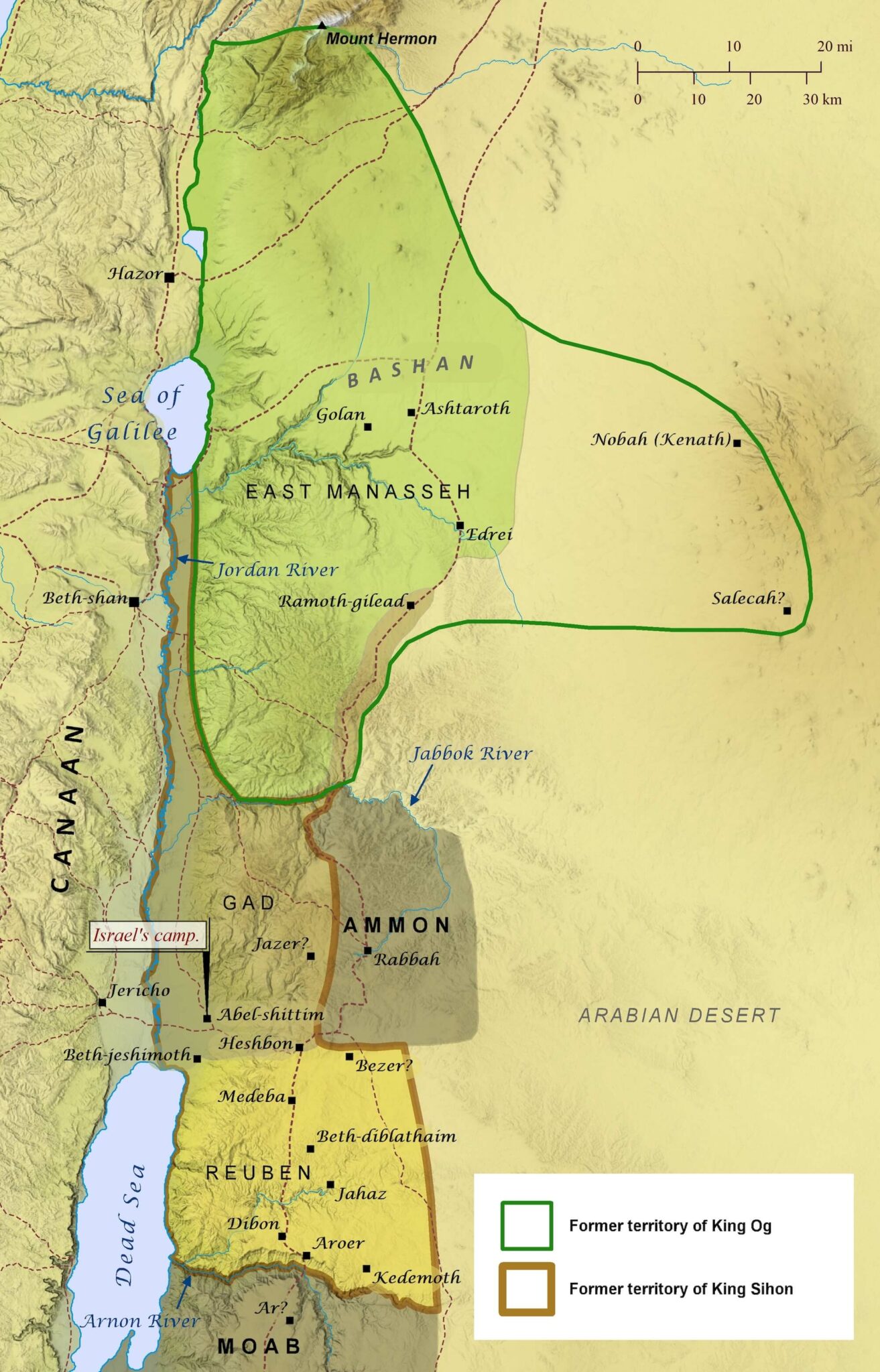Moses continues his history lesson with a reminder of the LORD hardening the spirit and heart of King Sihon to deliver him into the hands of the Israelites.
Having been told by God that the enemy would be defeated (vv. 24-25), Moses began to use diplomacy to conquer the land of the Amorites. In doing so, he sent messengers from the wilderness of Kedemoth to Sihon king of Heshbon with words of peace. The wilderness of Kedemoth was probably located beyond the eastern boundary of Moab. The Hebrew term translated here as “peace” is shalom, and it often designates a state of prosperity or good health (Genesis 43:27; Exodus 18:7). In this context, however, it conveys the idea of tranquility, harmony, or security, as in Genesis 34:21 and 1 Kings 5:12.
So, we see that Moses sent words of peace to reassure Sihon that he had good intentions. He said, “Let me pass through your land, I will travel only on the highway; I will not turn aside to the right or to the left.” Simply put, Moses claimed that he wanted to pass through the land of King Sihon without causing any trouble.
Moses further supported his claim by saying he was willing to purchase any food and drink he and the Israelites might have needed along the way. He argued, “You will sell me food for money so that I may eat, and give me water for money so that I may drink.”
In his tactics, Moses alluded to the sons of Esau and the Moabites as those who were favorable or even sensitive to his requests in order to capture the attention of Sihon. He claimed, “Only let me pass through on foot, just as the sons of Esau who live in Seir and the Moabites who live in Ar did for me, until I cross over the Jordan into the land which the LORD our God is giving to us.” By implication, Moses wanted King Sihon and the Amorites to be favorable to Israel as well.
The biblical account in the book of Numbers tells us that the Edomites did not allow Israel to transit through the heart of their land. That was the reason why the Israelites had to turn away from them to take a longer route (Numbers 20:21). As they turned away from Edom, the Israelites “set out from Mount Hor by the way of the Red Sea, to go around the land of Edom.” From this narrative in the book of Numbers, it can be said that Moses used the sons of Esau and the Moabites as illustration to convince Sihon in such a way that he would not deny access to his land. Or, if Sihon would deny access to the heart of his territory, he would at least grant access to go around it, like the Edomites did.
However, King Sihon was not impressed by the declaration made by Moses. Instead, he denied access through his land. The reason for such a behavior by Sihon was because the LORD hardened his spirit and made his heart obstinate. The verb translated here as hardened (hardened his spirit) is similar in form with the verb used in Exodus 7:3 where the LORD prevented Pharaoh from listening to Moses and the Israelites so that he could be judged. The idea is that God caused the heart of the king to be unmoved from its current intent so that he would not listen to Moses’ appeal.
Finally, Moses told the people that the purpose of God hardening the spirit and heart of Sihon was to deliver him into their hand. Stated differently, the hardening of the king’s heart and spirit was the first step that would lead to his complete failure. God said to Moses, “See, I have begun to deliver Sihon and his land over to you.” Again, the LORD reassured His people of the upcoming victory when He told them that Sihon was already defeated. That is why He issued the order, “Begin to occupy, that you may possess his land.”
Biblical Text
26 “So I sent messengers from the wilderness of Kedemoth to Sihon king of Heshbon with words of peace, saying, 27 ‘Let me pass through your land, I will travel only on the highway; I will not turn aside to the right or to the left. 28 ‘You will sell me food for money so that I may eat, and give me water for money so that I may drink, only let me pass through on foot, 29 just as the sons of Esau who live in Seir and the Moabites who live in Ar did for me, until I cross over the Jordan into the land which the Lord our God is giving to us.’ 30 “But Sihon king of Heshbon was not willing for us to pass through his land; for the Lord your God hardened his spirit and made his heart obstinate, in order to deliver him into your hand, as he is today. 31 “The Lord said to me, ‘See, I have begun to deliver Sihon and his land over to you. Begin to occupy, that you may possess his land.’
Check out our other commentaries:
-
John 18:19-24 meaning
John describes the first of Jesus’s three religious trials. It takes place in the home of Annas, the former high priest. Annas questions Jesus about...... -
Romans 5:6-8 meaning
Paul is again emphasizing that we are made righteous in God’s sight apart from anything we do. Christ did not die for us because we...... -
Genesis 19:30-33 meaning
Lot and his two daughters fled to a cave in the mountains. The oldest daughter devised a plan and gave Lot too much wine to...... -
Deuteronomy 7:7-11 meaning
God’s election of Israel was a free gift, which was based upon His gracious love for them and His faithfulness to their forefathers. ...... -
Deuteronomy 12:20-25 meaning
Moses again told the Israelites that they were allowed to slaughter of their herd and flock and eat their meat within their gates when the......





